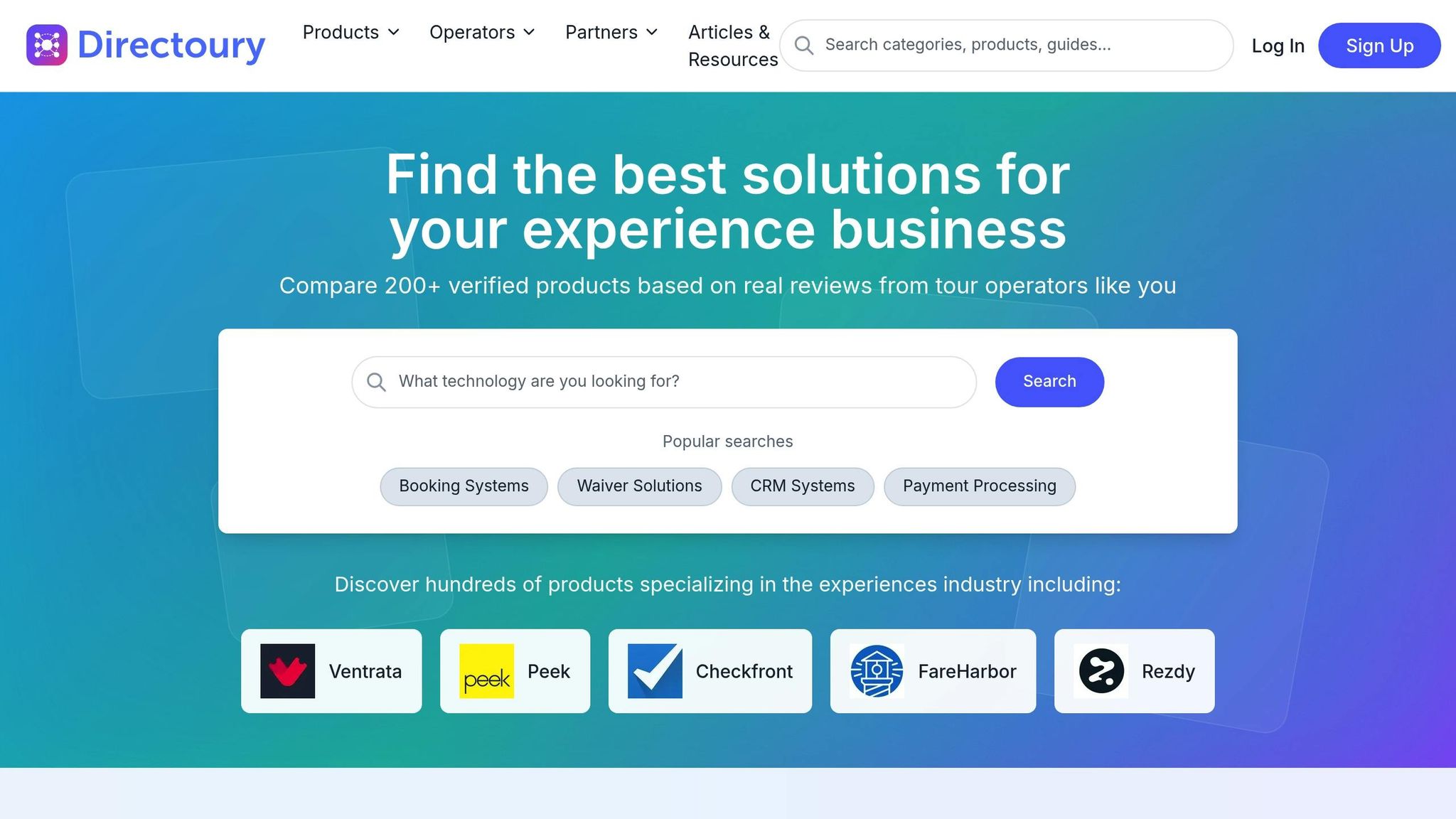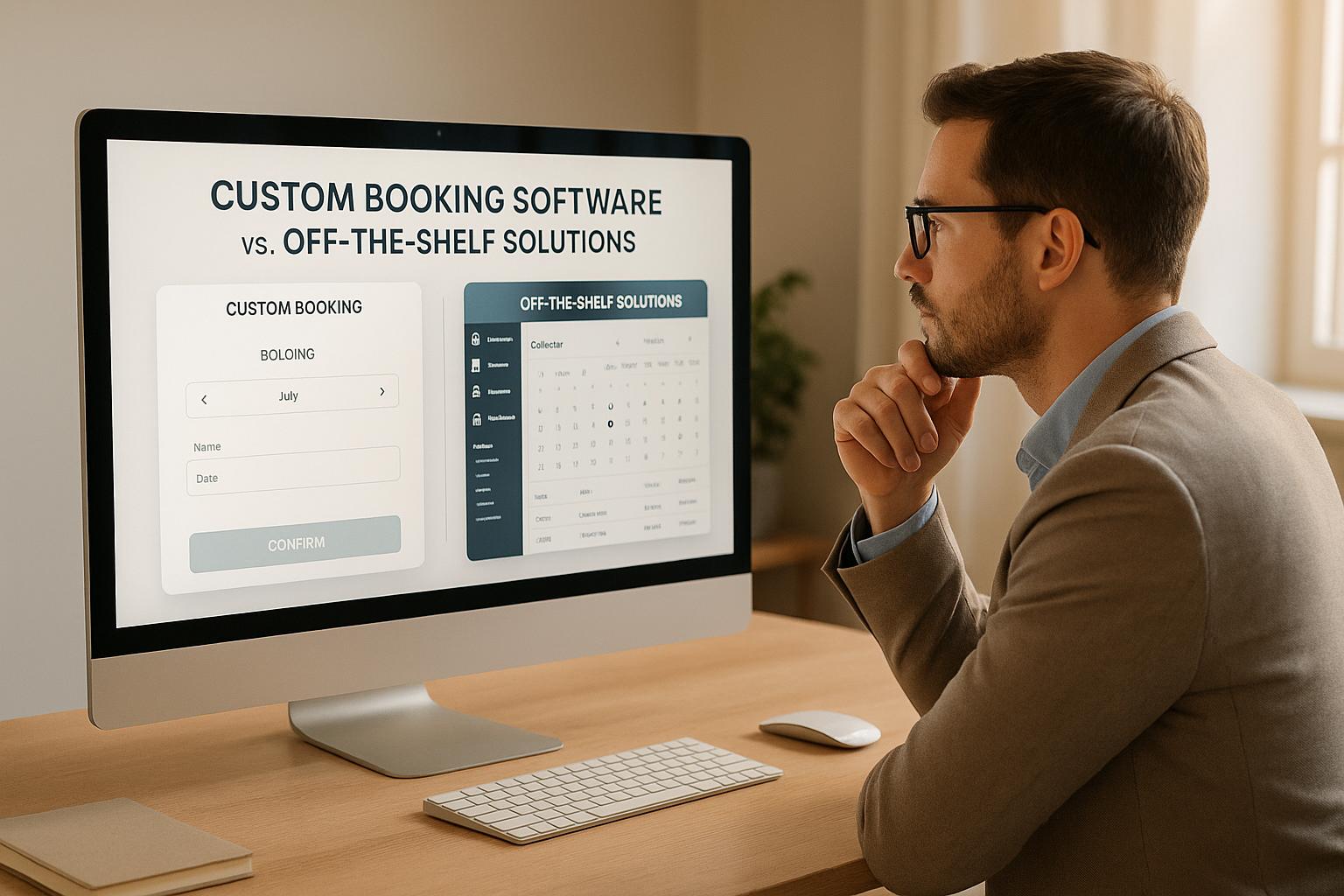Custom booking software is tailored to meet your specific business needs, offering full control, scalability, and integration with existing tools. However, it requires a high upfront cost, longer development time, and ongoing maintenance.
Off-the-shelf solutions are ready-to-use, cost less upfront, and are easy to implement. They include essential features like calendar management and payment processing but may lack flexibility, scalability, and customization for unique workflows.
Quick Comparison
| Criteria | Custom Booking Software | Off-the-Shelf Solutions |
|---|---|---|
| Initial Cost | High upfront cost | Low upfront cost, subscription-based |
| Time to Implement | Months to develop | Ready in days or weeks |
| Customization | Fully tailored to your needs | Limited to pre-built features |
| Scalability | Designed for growth | May struggle with large-scale needs |
| Maintenance | Requires in-house support | Managed by vendor |
| Long-Term Costs | Cost-effective for complex needs | Ongoing subscription fees |
Your choice depends on your budget, business complexity, and growth plans. Small businesses with simple needs may opt for off-the-shelf solutions, while larger or niche businesses with unique workflows often benefit from custom software.
How To Build An Appointment Booking App Like Zocdoc With No-Code Using Bubble (2024 Flexbox)
Custom Booking Software: Features, Benefits, and Drawbacks
Custom booking software requires a significant upfront investment, but it offers features designed specifically to meet your business's unique needs.
Key Features of Custom Booking Software
Complete control over functionality lets you design every aspect of the system to align with your operations. Whether it’s creating tailored booking flows, adding custom data fields, or addressing specific compliance requirements, the software is built to fit your business.
Integration with existing tools ensures your custom booking solution works seamlessly with your current technology stack. This means it can connect with payment processors, CRM systems, or other proprietary tools, reducing manual processes and eliminating data silos.
Scalability for growth means your software can evolve alongside your business. Whether you're managing bookings for a single location or coordinating multi-day, multi-location experiences, the system can adapt to your changing needs.
Full ownership of intellectual property ensures long-term control. By keeping the system’s code and features in-house, you reduce reliance on external vendors and retain the flexibility to make changes as needed.
Benefits of Custom Booking Software
Custom software aligns perfectly with your business processes, which can lead to smoother operations and a more seamless customer experience. It reduces inefficiencies, simplifies staff training, and minimizes operational disruptions.
It also gives your business a competitive edge. Features like personalized communication, unique scheduling options, and tailored upselling tools can help differentiate your services in the market.
Although the initial cost is higher, custom software can save money over time. You avoid recurring licensing fees and other expenses tied to off-the-shelf platforms. Plus, complete control over your data ensures sensitive customer and business information stays secure and accessible only to your team.
Drawbacks of Custom Booking Software
That said, custom solutions come with challenges.
High upfront costs are one of the biggest hurdles. The initial investment in development is substantial, and you won’t see the benefits until the system is fully operational.
Development takes time. Building, testing, and implementing a custom solution can delay your ability to respond quickly to market demands.
Ongoing maintenance is your responsibility. Unlike prebuilt platforms, where updates and bug fixes are handled externally, custom systems require dedicated technical support and resources to keep everything running smoothly.
You may also face dependence on key technical personnel. If those who built or maintain the system become unavailable, it can lead to complications. Early design decisions might also result in technical challenges down the road.
Lastly, future improvements are on you. Any upgrades, new features, or adjustments will require additional investment and effort from your team. This can be a significant burden if your business priorities shift or if you need to scale quickly.
Off-the-Shelf Booking Solutions: Features, Benefits, and Drawbacks
Off-the-shelf booking solutions offer a ready-to-use way to manage reservations and customer bookings. These platforms come pre-built with essential features and can be up and running quickly, making them a popular choice for many experience operators.
Key Features of Off-the-Shelf Solutions
- Quick setup: These solutions allow you to start accepting bookings in a matter of days or weeks, unlike custom-built software, which can take months to develop. This means you can start generating revenue almost immediately after implementation.
- Essential tools included: Most platforms cover the basics, such as calendar management, payment processing, customer communication, and basic reporting. These features cater to a wide range of businesses, from tour operators to activity providers.
- Automatic updates: Vendors handle software updates, bug fixes, and security patches, ensuring the system stays current without requiring technical expertise on your end. New features are often rolled out automatically, benefiting all users.
- Subscription-based pricing: Instead of a large upfront cost, these solutions offer predictable monthly fees, which often scale based on your booking volume, number of users, or selected features. This model simplifies budgeting and reduces financial risk.
- Third-party integrations: Many platforms connect seamlessly with tools like payment gateways and email marketing software, saving you time and reducing technical challenges.
Benefits of Off-the-Shelf Solutions
One of the biggest advantages is lower upfront costs, making these solutions accessible to businesses of all sizes. Instead of spending tens of thousands of dollars on custom software, you can get started with monthly fees ranging from $50 to $500, depending on the platform and your needs.
These platforms are also designed with ease of use in mind. Their intuitive interfaces, helpful guides, and customer support make it easy to get started. Most team members can learn the basics in just a few hours, minimizing the need for extensive training.
Another plus is proven reliability. These systems have been tested by thousands of users across different industries. Common bugs have already been addressed, reducing the risk of system failures that could disrupt your operations.
However, while these benefits are appealing, there are some trade-offs to consider.
Drawbacks of Off-the-Shelf Solutions
One common issue is limited customization. If your business has unique needs that fall outside the platform's standard features, you may find yourself constrained. While some platforms offer configuration options, you're ultimately bound by what the vendor has built.
Scalability concerns can also arise as your business grows. A solution that works well for a small operation might struggle to meet the demands of a larger business with multiple locations or complex booking requirements.
Recurring subscription costs can add up over time. For example, a $200 monthly fee translates to $2,400 annually or $12,000 over five years. For businesses with stable needs, these ongoing costs might eventually outweigh the expense of developing custom software.
Vendor dependency is another risk. If the provider changes its pricing, discontinues features you rely on, or shuts down entirely, your operations could be severely affected. You're also dependent on their schedule for bug fixes and new features.
Data portability can become a headache if you decide to switch platforms. Some vendors make it difficult to export booking history, customer information, and other critical data, complicating the migration process.
Finally, the generic interface of many off-the-shelf solutions may not fully reflect your brand or deliver the customer experience you envision. Since these platforms are designed for broad use, they may lack the personalization needed to highlight your business's unique qualities.
These considerations highlight the trade-offs involved and set the stage for comparing off-the-shelf solutions with custom-built options.
sbb-itb-3dd36ef
Custom vs. Off-the-Shelf: Side-by-Side Comparison
To wrap up the earlier discussions on the pros and cons, here's a clear breakdown of the main differences between custom and off-the-shelf booking software. Deciding between the two comes down to weighing factors like cost, scalability, and how well each option aligns with your business goals.
Comparison Table: Custom vs. Off-the-Shelf Solutions
| Criteria | Custom Booking Software | Off-the-Shelf Solutions |
|---|---|---|
| Initial Investment | Requires a higher upfront development cost | Lower upfront cost, often subscription-based |
| Time to Implement | Longer development timeline | Quick to deploy, sometimes ready in weeks |
| Customization | Fully tailored to your business needs | Limited to vendor's configuration options |
| Scalability | Built to grow with your business | May hit limits as your business expands |
| Integration | Seamlessly integrates with your current systems | Depends on vendor-supported APIs, may need tweaks |
| Data Ownership | Offers full control over your data | Governed by vendor policies |
| Ongoing Support | Requires in-house or outsourced technical support | Managed and updated by the vendor |
| Feature Flexibility | Custom features can be added based on your needs | Updates follow the vendor's schedule |
| User Experience | Fully branded, tailored interface | Standardized interface |
| Long-Term Costs | More cost-effective for high-volume, complex needs | Ongoing subscription costs can add up |
While off-the-shelf solutions might seem more affordable upfront, custom software often becomes the smarter choice in the long run, especially for businesses with complex operations or high transaction volumes.
Key Factors for Experience Operators
Here are some practical considerations to help you decide which solution works best for your business.
- Business Size and Complexity: Smaller businesses often lean toward off-the-shelf options because of their lower costs and faster setup. But larger or multi-location businesses, especially those with intricate workflows, usually benefit more from custom software tailored to their needs.
- Unique Workflows: If your business operates in a niche or handles highly specific processes, off-the-shelf platforms may feel restrictive. Custom solutions offer the flexibility to address those unique requirements.
- Scalability: As your business grows, off-the-shelf solutions might struggle to keep up. Planning for future scalability with a custom system can save you from expensive and disruptive migrations later.
- Technical Support Needs: Custom solutions require ongoing technical support, either through your internal team or an external provider. On the other hand, off-the-shelf platforms are easier to manage, especially when technical resources are limited.
- Integration with Other Systems: If your business relies on specialized tools or custom reporting, a custom booking system provides smoother integration. Off-the-shelf software, while convenient, may require compromises or additional workarounds.
Ultimately, the right choice depends on your current needs and where you see your business heading. Whether you prioritize cost, flexibility, or scalability, aligning your decision with your long-term goals will help ensure success.
Selecting the Right Solution for Niche Markets
If you're running a niche business - whether it's ghost tours, rock climbing, or underwater photography - you've likely discovered that mainstream booking software doesn't always meet your needs. These unique challenges make the decision between custom-built and off-the-shelf solutions especially important.
Software Requirements for Niche Experience Operators
When it comes to specialized operations, generic platforms often fall short. For example, adventure sports companies need tools to manage liability waivers and equipment, while educational tour operators might require features like curriculum integration and group learning analytics. These needs often make a custom solution worth the higher upfront investment.
Regulatory compliance is another major factor. A wine tour company, for instance, might need to track alcohol service laws across various states, while wildlife tour operators may require tools for permits and conservation reporting. Generic platforms rarely include such industry-specific features, making custom development a practical choice for highly regulated niches.
For U.S.-based businesses, localization is critical. State-specific tax calculations, MM/DD/YYYY date formats, and precise U.S. dollar formatting (like $1,234.56) are often easier to implement in custom solutions. Off-the-shelf platforms may require cumbersome workarounds or additional integrations to meet these regional needs.
Planning for growth is also essential. A niche business, like an escape room operator, might start with a single location but aim to expand into a franchise. Custom software can be designed to handle multi-location management and complex franchise reporting from the start. In contrast, off-the-shelf options may struggle to adapt to these advanced needs. As your business scales, you'll also need seamless integration with specialized tools, something custom solutions can handle more effectively.
Many niche operators rely on industry-specific tools for inventory management, safety tracking, or certification verification. Custom solutions can integrate these systems directly, eliminating the need for separate databases or manual workarounds. Given these complexities, consulting with external experts can be a game-changer.
Using Resources Like Directoury

Platforms like Directoury offer valuable support for niche operators by connecting them with technology vendors who understand their unique challenges. Instead of spending months researching generic software, you can get recommendations tailored to your specific needs.
With access to over 200 verified vendors specializing in niche markets, Directoury ensures you're connecting with developers who have experience in your industry. Their verification process guarantees you're working with reliable vendors who have a proven track record in serving experience-based businesses.
Directoury takes a personalized approach to matching you with the right technology. Their system considers not only your basic booking needs but also your industry-specific requirements, regulatory challenges, and growth ambitions. This saves significant time compared to generic software directories that may not fully grasp the nuances of your business.
Their buyer's guides are another valuable resource. These guides include checklists, vendor evaluation frameworks, and detailed timelines designed to address the complexities of niche booking requirements. Whether you're deciding between custom development or off-the-shelf solutions, these tools help you make informed choices.
Perhaps most importantly, Directoury provides peer reviews from other niche operators. These insights go beyond generic software review sites, offering feedback from businesses that share your specific challenges and operational needs. This real-world perspective can be crucial when weighing your options.
Directoury’s holistic approach also helps you evaluate booking software alongside other essential tools like waiver systems, channel management, and marketing automation. Whether you choose a custom-built solution or an off-the-shelf platform, this comprehensive view ensures your booking software integrates seamlessly with the rest of your tech stack.
Conclusion: Making the Right Choice for Your Business
Deciding between custom booking software and off-the-shelf solutions depends entirely on your business’s specific needs, budget, and growth plans. It's not a decision that fits neatly into a single formula.
Off-the-shelf solutions are often ideal for businesses with straightforward booking needs, limited budgets, or tight timelines. For example, if you manage a ghost tour or an escape room, these ready-made platforms can get you up and running quickly. They offer reliable functionality, ongoing support, and predictable pricing, making them a practical choice for many standard operations.
On the other hand, custom booking software shines when your business has unique workflows, requires complex integrations, or must meet specialized compliance standards. Take wine tour operators navigating state-specific regulations or adventure sports companies managing equipment and liability waivers - custom solutions can streamline operations by reducing manual work and eliminating the need for workaround processes.
While custom software typically involves a higher upfront cost, it often pays off in the long run with lower ongoing expenses and better scalability. Conversely, off-the-shelf platforms may start with lower recurring fees, but additional costs - like transaction charges, add-ons, and integration fees - can add up as your business grows.
Your growth plans are another critical factor. If you're gearing up to expand locations, diversify services, or even franchise, custom software can be built with these goals in mind from day one. Meanwhile, off-the-shelf solutions might require costly upgrades or migrations down the road to accommodate such changes.
For niche businesses, resources like Directoury can help you connect with vendors who understand your industry’s unique challenges. Instead of spending months researching generic options, you can find experts who know your specific needs and can recommend solutions that integrate seamlessly into your existing systems.
Ultimately, the right booking software will align with your current operations while supporting your future ambitions. By taking the time to map out your processes, address pain points, and anticipate growth, you can choose a solution that evolves with your business rather than holding it back.
FAQs
What should businesses consider when choosing between custom booking software and off-the-shelf solutions?
When choosing between custom booking software and off-the-shelf options, it's important to weigh your business needs, budget, and future goals. Custom software works best for businesses with unique demands, as it provides tailored features, room for growth, and stronger security. That said, it typically comes with higher upfront costs and longer development times.
On the flip side, off-the-shelf solutions are more budget-friendly and faster to roll out. They're a solid option for businesses with standard requirements or tighter budgets. To make the right choice, think about factors like how well the software will integrate with your current systems, whether it supports your growth plans, and how much customization your business truly needs.
What are the benefits of custom booking software for niche businesses compared to off-the-shelf solutions?
Custom booking software gives niche businesses the power to create tools that align perfectly with their specific needs and workflows. Unlike generic, off-the-shelf platforms, custom solutions are designed to address unique challenges and requirements that standard software often misses.
Another big advantage is scalability and flexibility. Custom software can grow and adapt as your business evolves, removing the limitations that come with pre-built options. This adaptability can be a game-changer, giving niche businesses an edge in their market. While off-the-shelf software might seem like a budget-friendly choice at first, custom solutions are a long-term investment designed to grow with your business.
What are the long-term costs of custom booking software compared to off-the-shelf solutions?
Custom booking software often comes with a higher initial price tag, typically ranging from $50,000 to $500,000, depending on its complexity. Despite the steep upfront cost, it provides key benefits like the ability to grow with your business, tailored features, and potentially lower ongoing expenses. For companies with unique or specific needs, this can be a smart long-term investment.
On the other hand, off-the-shelf solutions are more budget-friendly at the start. However, they often include recurring fees, offer limited customization options, and might struggle to keep up with growing or specialized demands. Over time, these limitations can result in higher overall costs, particularly for businesses with changing or niche requirements.




